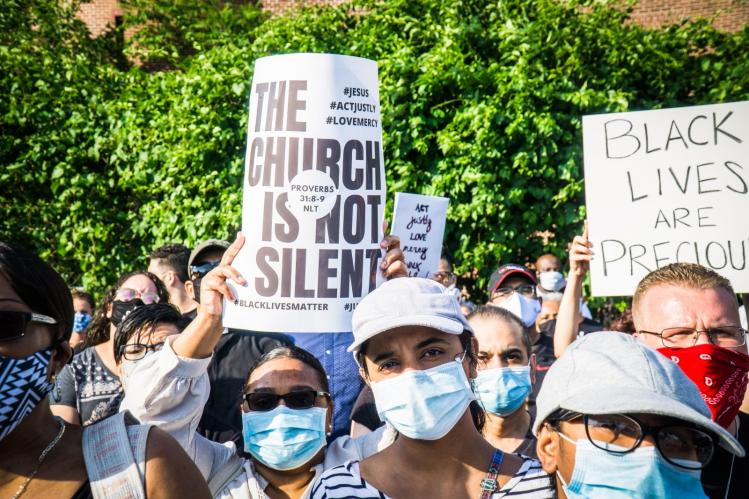
Interested in discussing this article in your classroom, parish, reading group, or Commonweal Local Community? Click here for a free discussion guide.
Amid the protests in American cities that followed the May 2020 murder of George Floyd by police, Los Angeles Archbishop José Gomez, the president of the U.S. bishops conference, issued a statement. “It is true what Rev. Martin Luther King, Jr. said, that riots are the language of the unheard,” Gomez wrote. “We should be doing a lot of listening right now. This time, we should not fail to hear what people are saying through their pain.”
It was a sensitive response, expressing compassion and a humble commitment to “listening” as the necessary first step toward a more just society. It bears no resemblance to the speech Gomez delivered to a Spanish conference earlier this month, a speech that left me wondering who on earth he’s been listening to.
That talk, a keynote address for a conference on “Political Correctness: Liberties in Danger,” was pre-taped and delivered in Spanish but shared as an English text by the Archdiocese of Los Angeles. In it, Gomez explains that “new social justice movements” that function as “pseudo-religions” have been “unleashed” in American society, and demand resistance from Catholics.
Gomez says that “we should not be intimidated by these new religions of social justice and political identity,” but he sounds pretty intimidated. His first section is conspiratorial and riddled with anti-Semitic tropes, as he describes the rise of “an elite leadership class...that has little interest in religion and no real attachment to the nations they live in...which is in charge in corporations, governments, universities, the media, and in the cultural and professional establishments” and “wants to establish what we might call a global civilization.” Gomez is not building a specifically anti-Semitic argument—there’s nothing specific about his argument at all—but the rhetoric he chooses has a very ugly history, and its presence here is alarming.
“For years now,” Gomez continues, “there has been a deliberate effort in Europe and America to erase the Christian roots of society and to suppress any remaining Christian influences.” Where does this reactionary vision come from? Which people has Gomez been listening to? Certainly not Catholics who work with the Black Lives Matter movement, who could explain how standing up for the dignity of their neighbors is an expression of their faith. Not admirers of Dorothy Day, who would have stopped him from ludicrously suggesting that her example somehow validates his idea that “the ‘social justice’ story” is an atheistic “rival” to Christianity.
It is disorienting to hear a bishop referring pejoratively to “social justice.” Gomez eventually recognizes this dissonance, then dismisses it with a wave of the hand: “Of course, we all want to build a society that provides equality, freedom, and dignity for every person.” If that is what “we all want,” why the paranoia? Why not begin with that set of priorities and imagine a path forward? Gomez’s next sentence identifies the hang-up: “But we can only build a just society on the foundation of the truth about God and human nature.”
Ah, of course, human nature. “The ‘space’ that the Church and believing Christians are permitted to occupy is shrinking,” Gomez warns. “Holding certain Christian beliefs is said to be a threat to freedoms, and even to the safety, of other groups in our societies.” When bishops start talking like this, you don’t have to be “woke” to know it’s primarily LGBTQ visibility and civil rights they’re complaining about.
If the “certain Christian beliefs” Gomez is referencing are the ones that label same-sex love as sinful and transgender people as delusional, it is true that expressing those beliefs can be uncomfortable, and enforcing them with policy is harder than it once was. Is that, as Gomez claims, because of the nefarious influence of an anti-Christian class of elites? Or is it because people, including many Catholics, have learned that those beliefs are not the truth, and it alienates people when you insult them or their loved ones in the name of Christ?
The Church is still struggling to listen, especially to the voices of the LGBTQ community. It is too threatening to imagine that the Church might yet have something to learn about sex and sexuality, or, worse, might find itself to have been on the side of hate and violence. It seems easier to cry foul, to close ranks.
When Catholic leaders insist on pushing marginalized people back into the shadows, other prophets will step up. The movements for social justice in the United States are not an attack on religion. They are a sign that what Gomez called for in 2020 is happening. People are hearing the voices of the oppressed and the suffering. They are embracing a vision of diversity that is enriching, not frightening; a view of history and humanity that is honest, not manipulative; an approach to politics that is generous and mutual, not defensive and tribal. And if bishops like Gomez are busy inventing reasons to stand in opposition to these efforts—people can hear their voices, too, and that is the real danger the Church ought to worry about.

